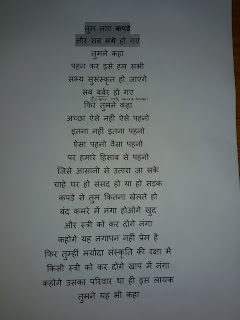Magic Land or Real World?
As a part of our study we have completed the Harry Potter's one part "Deathly Hallows" and the task is given by the teacher is here... (to see the main task click here)
The theme of choosing your destiny rather than being born into
it extend throughout the book, right down from Harry Potter’s name.
Choices means making life our OWN.
Love in Harry Potter:
Love, as a word is diluted in meaning as simple pleasure, sexual attraction, something worth dying for. It can describe as an intense feeling of affection, an emotion or an emotional state. The ancients gave these different aspects in their own words; and, scriptural instruction is quite descriptive.
"Love is patient, love is kind. It does not envy, it does not boast, it is not proud. It is not rude, it is not self-seeking, it is not easily angered, it keeps no record of wrongs. Love does not delight in evil but rejoices in the truth. It always protects, always trusts, always hopes, always perseveres. Love never fails. (1 Corinthians 13:4)"
The characters in Harry's life are very well developed, that it isn't difficult to determine who is capable of having and expressing love. Petunia and Vernon struggled between "possessing" and "loving" even Dudley, who they cared about. Snape, unlike Voldemort, had been loved and could love; but, like Voldemort, chose not to. Hermione and Ron have begun as friends; but, by "taking the blows," are finding an often misunderstood and neglected pathway to love — service.
Death and Its meaning to Life:
Harry's saga has begun, with the aftermath of death — his parents. The boy character's life story had its gestation in his literary "mother's" (JKR) struggles to deal with the progressively fatal disease of her own mother. Imagination had been fostered, values learned and natural abilities encouraged; until, with a verdant flash of light, the handsome 11-year-old with glasses broke from the mist and "simply strolled into (Joanne Rowling's) mind, fully formed." A boy who didn't know that he was a wizard, until he received acceptance to wizarding school; and, whose personal story of dealing with death and adversity, simply MUST be told!
Harry, as the boy would be known, began the life "inflicted" upon him in the home of his abusive step-parents, the Dursley's. The self-serving arrogance and lust for power, of a man he had never met, had created an orphan and defined Harry's life for the next seventeen years — if not forever. The initial capturing of Harry's story consumed Rowling's efforts, and possibly provided moments of respite from her own struggles. She admits that Harry's initial "death scene" had been written in a somewhat "cavalier fashion," and despairs that she had never told her mother about her new "imaginary friend."
Within six months, Rowling's mother had died, and she could now tell by experience, just how "superficial" her depiction had been. The subsequent blossoming of the wizarding world into print, occurred within the context of her admitted "struggling with religious belief," and the effects of loosing her mother. It is in the viewing of Harry's life and world in this context, which gives his story its most poignancy. His scar came from his mothers selfless sacrifice motivated by love. The Mirror of Erised, which "shows a person's deepest desire," revealed to Harry the vision of the author, to see her own mother again. Then, the mirror was followed by Hagrid's "photo album" which enabled his continued relationship with deceased loved ones he could barely remember.
Harry's life was filled with loss and Rowling said that in order to keep her feelings about the story in perspective, before writing anything else, she had to write an "epilogue," which could remind her where the characters would end.
Harry Potter as Adult Literature more than Children Literature:
Here are the points that proves that it is an adult literature...
• Humor blended with the fantasy (Deborah Brothers)
• Insight into the human condition (Oona Eisenstadt)
• Inventive world-building (Mary Baron)
• The plots grow in complexity as the series continues, particularly as Rowling draws in the back stories about Harry Potter’s parents and their relationships with other professors, wizards, etc. (Sarah Park)• As Rowling grows as a writer, Harry grows as a character, and young adults grow as readers. (Mary Catherine Russell)
• The sense of nostalgia that ties us to the characters and the books (Kerry, PhD candidate, University of Pittsburgh)
• Particular well-developed characters — Lupin, for example: “there’s a dark but melancholy quality about him that stays with me” (Chris Doyle) or Dolores Umbridge, who is one of the most satisfyingly chilling characters Rowling created, far more sinister than Voldemort! (Jeffrey Canton)
• Particular scenes, such as in the graveyard, when those Voldemort has killed come out of his wand
• Emotional connections to characters — Harry trying to understand his parents without having known them at all (Sharon Levin)
• The fan-base connections to a community with shared experiences
• Elegantly recurring threads (characters, history, themes) from the early books that find their knots and conclusions in the later ones.
Give your views about my blog here. But before that read this rubric.
Resources:http://potter-scarpnotes.djmed.net/sorcerers/hpscarpthemes1.html
https://www.washingtonpost.com/blogs/college-inc/post/is-harry-potter-classic-childrens-literature/2011/07/16/gIQA0RS1HI_blog.html?utm_term=.95bdf76b51a2




As per this rubric
ReplyDeletehttp://webquest.org/sdsu/webquestrubric.html
I am giving 40 marks to my blog.